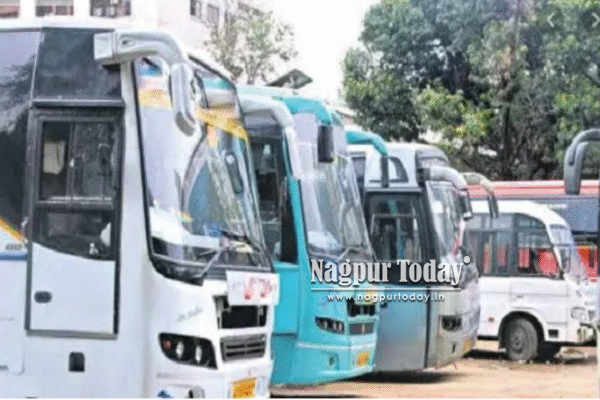
Nagpur: In a stinging rebuke to the Nagpur Traffic Department, the Nagpur Bench of the Bombay High Court has quashed the arbitrary detention of private buses and ordered their immediate release. The Court also pulled up the State Government for its failure to provide proper bus terminals and designated stops in Nagpur city despite repeated directives over the years.
The division bench of Justice Anil Killor and Justice Ajit Kadethankar was hearing a writ petition filed by private bus operators Om Gupta, Virendra Bube, Moh Rafique, and Umesh Gupta. The operators had challenged the controversial order of the DCP (Traffic), issued on August 12, which imposed a blanket ban on private buses from entering city limits between 8 am and 10 pm.
Appearing for the petitioners, senior counsel Adv Tushar Mandlekar launched a scathing attack on the traffic police’s decision, terming it illegal, unconstitutional, and beyond jurisdiction. He argued that the DCP has no power to enforce a sweeping ban or to arbitrarily designate parking areas outside the city. Such powers, he emphasized, are not vested under Section 115 of the Motor Vehicles Act, 1988.
Mandlekar further reminded the Court that the order brazenly violated official instructions from both the Transport Commissioner in Mumbai (July 2, 2025) and the Additional Director General of Police (Traffic), Maharashtra (July 3, 2025). These communications had made it crystal clear that private buses with valid All India Permits are entitled to operate within city limits for pick-up and drop-off of passengers.
Calling the DCP’s move “unfair, unreasonable, and unconstitutional,” Mandlekar said it infringed upon the fundamental rights of the petitioners guaranteed under Articles 14, 19(1)(g), and 21 of the Constitution of India. He stressed that the State Government cannot shrug off its statutory responsibility to provide proper parking bays and bus stops under Section 117 of the Motor Vehicles Act, Rule 110 of the Maharashtra Motor Vehicles Rules, and Section 243-A of the Maharashtra Municipal Corporation Act.
“The failure of the government to build bus terminals cannot become an excuse to punish bus operators who are legally operating with valid permits,” he argued.
Mandlekar also clarified that buses can only be detained under Section 207 of the Motor Vehicles Act if they are found violating permit conditions. In this case, no such violations existed. The detention of buses, therefore, amounted to nothing more than harassment and a gross misuse of authority.
Adv Chhotu Uikey, representing the DCP (Traffic), initially defended the order by citing Section 115. However, during arguments, he conceded that no punitive action could be taken against buses holding All India Permits, especially in light of the July 3, 2025, notification issued by the ADGP (Traffic), Maharashtra.
The High Court, while granting relief to the petitioners, ordered the immediate release of all detained buses. It also demanded explanations from the State Government and other concerned authorities on why the city continues to function without proper bus terminals and parking facilities. The bench has directed all respondents to file their replies by September 3, 2025.
The order has come as a major reprieve for private bus operators, who have long alleged harassment and discriminatory treatment at the hands of the traffic police in Nagpur.














